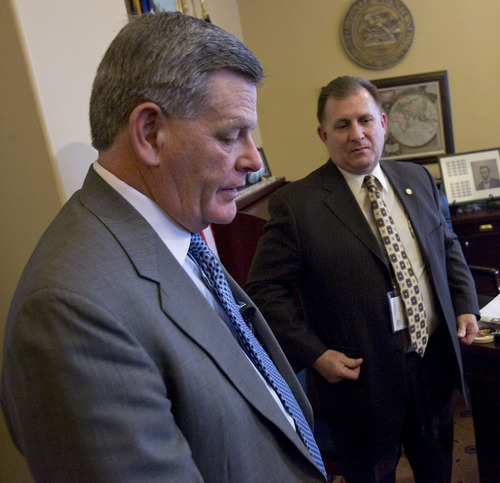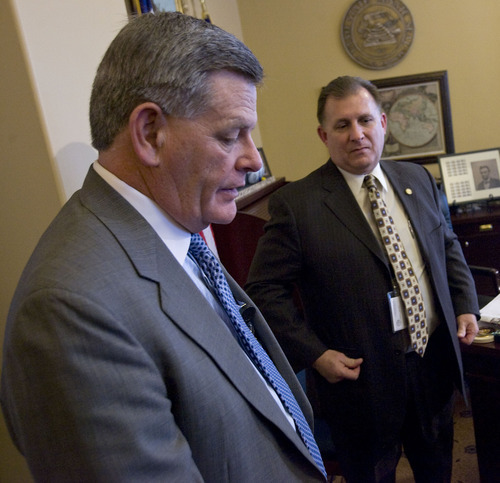This is an archived article that was published on sltrib.com in 2011, and information in the article may be outdated. It is provided only for personal research purposes and may not be reprinted.
A comprehensive immigration reform proposal that plucks key provisions from several other immigration bills — including Rep. Stephen Sandstrom's enforcement-only measure — was floated Wednesday. If key senators get their way, the initiative will become the Legislature's multifaceted solution to the illegal immigration problem and could push aside other measures attempting to address it in piecemeal fashion.
Sen. Curtis Bramble's SB288 incorporates elements of Sandstrom's bill, HB70; Rep. Chris Herrod's HB253 that would sanction businesses that hire undocumented workers; and Rep. Carl Wimmer's bill, HB191, that would repeal in-state tuition for undocumented students. The Bramble measure, however, wouldn't do away with the in-state tuition but would allow it for families of permitted guest workers.
Bramble's measure, touted at a news conference in Senate President Michael Waddoups' office that featured Bramble and Senate Majority Leader Scott Jenkins, also contains somewhat of a supremacy clause, in which it states that even if bills authored by Herrod and Sandstrom are signed into lawn, the Bramble bill would trump them. Waddoups did not attend the conference.
The bill leans heavily on Rep. Bill Wright's guest worker bill as its framework. That measure, HB116, cleared the House on Wednesday.
Bramble said he wanted to incorporate elements of the Utah Compact — a document signed by almost 4,000 people and supported by the LDS Church that seeks a more compassionate solution to immigration — as well as Gov. Gary Herbert's six guiding principles on the issue.
The Provo senator said it also was a way to avoid the stigma of Arizona's approach to immigration reform.
"The reality is an Arizona solution may not be a Utah solution," Bramble said. "We're faced with the challenge of how do we deal with the issues that weren't the creation of the state Legislature. We didn't ask to be thrown into this contest."
Bramble didn't release the text of his bill and instead spoke in generalities about what it proposed, though The Tribune read through a draft of it. The Senate Republican caucus received copies of the working bill — titled the Utah Compact Immigration Bill — and Jenkins said he expected there to be a lot of "wrangling" in the next few days.
But Jenkins did say the bill moved in a different direction than the enforcement-only and punitive approaches that were passed in the House.
"We're trying to get our hands around it." Jenkins said. "I would agree — I think this is a little kinder, gentler. But this is far from done. We're still knee-deep in it."
Bramble has been working on putting together a comprehensive bill for weeks — arranging meetings with lawmakers and officials vested in the process. Included in those meetings were Wright, Sen. Luz Robles, Sandstrom and Herrod.
Both Sandstrom and Herrod soon chose to opt out of Bramble's so-called "coalition of the wiling" by claiming an omnibus bill was a way to do nothing on the issue.
Sandstrom took it personally, saying "don't mess with my enforcement bill and don't mess with Representative Herrod's bill."
"I think the Senate should vote on my bill — up or down — on its own merits," he said. "This is a way to gut my bill."
Herrod was even more adamant, saying, "I think what Senator Bramble has done is completely wrong."
"Two can play this game. Everybody thinks it's always [a fight] between Democrats and Republicans, well sometimes it's between the House and the Senate," Herrod said. "I expect Speaker [Becky] Lockhart to fight for us and I believe she will."
Likewise, Wimmer promised to resist any changes to his HB191 to wipe out in-state tuition for undocumented students who graduate from a Utah high school.
"There will be no amending of my bill," Wimmer said.
Wimmer's bill and Herrod's measure are both in line to be debated on the House floor Thursday.
The Bramble bill, which would require a federal waiver and would take effect in 2013, includes a provision that would allow those who have overstayed their visa to pay a $1,000 fine, get a background check and work in Utah. If they came without a visa, they would pay a $2,500 fine and then be eligible for the guest worker program.
The bill also allows guest workers to bring their families to live in Utah while they are gainfully employed in the state.
It also sets up a program called U-verify — modeled after the federal government's E-verify program — that would allow undocumented workers a chance to work in the state legitimately. Bramble's bill would run the guest worker program out of the Department of Workforce Services.
It also took a portion of Wimmer's bill by allowing children of qualified guest workers in the state to continue to receive in-state tuition.
The bill also is softer on English proficiency, modeled after Wright's proposal that says learning the language is an option. The Robles bill required undocumented immigrants to not only become proficient in English, but they also had to take civics courses as well.
Bramble's bill also includes Sandstrom's enforcement-only provisions under a severability clause — meaning if the courts challenge that provision of the bill, it can be tossed while keeping the rest of the bill in tact.
Utah Compact Immigration Bill
An attempt at forging an omnibus immigration bill is under way on Utah's Capitol Hill. As now envisioned it would:
• Require local police to check for legal status when someone was arrested on a Class A misdemeanor or felony.
• Impose sanctions on business that hired undocumented workers
• Set up a state guest worker program
• Continue in-state tuition for families of guest workers
• Seek a federal waiver













